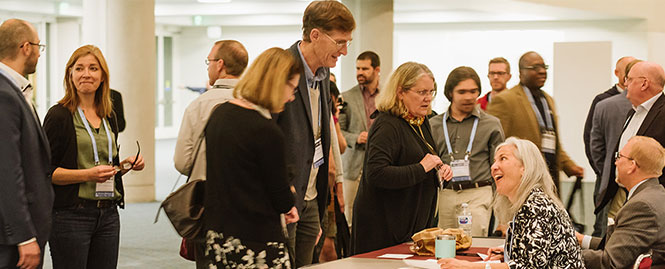Friday, November 21
9:00 - 11:00 AM
Location: TBA
Presentations
Christopher Porter, (Trinity College Theological School— Parkville), Presiding
Polemic, Counterstory, and Narrative Repair in the Parable of the Pharisee and the Tax Collector (Luke 18:9–14)
Aminta Arrington, John Brown University
An Attack or Defense? The Apologetic Function of Luke 24:37–39
Lee Hoffer, University of Chicago Divinity School
“The Fact Is, You Have Had Five Husbands…”: Shaming and Anti-woman Polemic in John 4 and in (Feminist) Interpretation
Hannah Craven, University of St. Andrews
Identity and Inclusion in Mark’s Gospel: The Case of Jesus and the Syrophoenician Woman
Elizabeth Shively, Baylor University
Fri Nov 22
3:30 - 5:30 PM
Indigo 202B (Second Level) - Hilton Bayfront
What happens when religious discourse becomes religious polemic, and how can we understand it further? In 2024 the Multidisciplinary Approaches to the Gospels will start a focus on religious polemic, considering how different methodological approaches to polemic in narrative may illuminate and elucidate varying interpretations, and potentially different approaches to understanding and resolving enmity. In 2024 we have a panel of invited papers to consider the polemical nature of the trial and crucifixion scene in the Gospel of John (18:38–19:37). What can varying approaches teach us? Questions may be directed to Chris Porter ([email protected]) or Elizabeth Shively ([email protected]).
Christopher Porter, Trinity College - Parkville, Presiding
Christopher Skinner, Loyola Chicago
Literary Critical Approach to Polemic in John 18:38–19:37 (25 min)
Laura Hunt, Spring Arbor
Cognitive Blending Approach to Polemic in John 18:38–19:37 (25 min)
Christopher Porter, Trinity College
Socio-scientific Approaches to Polemic in John 18:38–19:37 (25 min)
J. Brian Tucker, Moody Theological Seminary, Respondent (15 min)
Discussion (30 min)
3:30 to 5:30 pm
11/17/2023
Conference Room 3
For 2023 the theme of our session will be "Space/Setting in Gospel Narratives." For more information please contact Elizabeth Shively ([email protected]) or Chris Porter ([email protected]).
Christopher Porter, Trinity College Theological School, University of Divinity, Presiding
Amber Dillon, Ridley College
John the Baptist’s Spacial Drama: Memory and Intertextuality in the Fourth Gospel (30 min)
Eric Foster-Whiddon, University of St Andrews
Neither on This Mountain nor in Jerusalem: Blending Religion and Philosophy in Apollonius of Tyana and the Gospel of John (30 min)
Andrew H. Waller, Ridley College
“Remember How He Told You”: Narrative Transportation and the Lukan Passion Predictions (30 min)
Gregory Richardson, Redemption University
Mark’s Gospel: Space; The Place of Artificial Intelligence in Biblical Text Analysis (30 min)
Multidisciplinary Approaches and the Gospels
3:30 PM to 5:30 PM
11/18/2022
Plaza Court 3 (Plaza Tower - Concourse Level) - Sheraton Downtown (SD)
In 2022, we issued a general call for papers that engage a range of multidisciplinary approaches—especially focused on the social sciences and cognition—to the Gospels. For more information, please contact Elizabeth Shively ([email protected]) and Chris Porter ([email protected]).
Christopher Porter, Trinity College Theological School, Presiding
Cory M. Marsh, Southern California Seminary
A Hermeneutic of Trauma: Exploring the Collective Betrayal in John 14–16 (20 min)
Hannah Craven, University of St. Andrews
Trauma Hermeneutics and Reading Resurrection in the Gospel of John (20 min)
Rachel Danley, University of Aberdeen
Temple Spatiality as a Conceptual Framework for Purity in the Fourth Gospel (20 min)
Gregory E. Lamb, Southeastern Baptist Theological Seminary
The Church's Reception of Luke 16:19–31 in Word and Image (20 min)
Break (5 min)
Discussion (35 min)
11/19/2021
1:00 PM to 3:00 PM (CT)
Room: Virtual/Online
In 2021 we are issuing a general call for papers that engage a range of disciplinary approaches - especially focused on the social science - to the Gospels.
Elizabeth E. Shively, University of St. Andrews, Presiding
Christopher A. Porter, Trinity College Theological School
Sleeping in the Storm: Assessing the Intertextual Memory Primes for the Jonah Narrative from Mark 4:35-41 (20 min)
Julie Newberry, Wheaton College (Illinois)
Intertextuality and Intersectionality in Gospel Studies: The Case of Elizabeth (Luke 1) (20 min)
Jeannine Hanger, University of Aberdeen
The Sound and Smells of Death and Life: A Sensory Analysis of John 11:1-12:8 (20 min)
Jan Rüggemeier, University of Bern
The Woman who Anoints Jesus as Transworld Character: How a Cognitive Science Approach Enriches the Interpretation of Gospel Character (20 min)
Discussion (40 min)
[ibr_research_group year="2020"]
This IBR research group did not meet in 2019.
The purpose of this research unit is to explore the various ways the New Testament writings shape early Christian identity within the context of the Roman world generally and Judaism specifically. This year, papers will probe ways that sciences of mind (e.g., philosophy, psychology, neuroscience, anthropology, linguistics) inform the investigation of the formation of identity in the New Testament.
-
Elizabeth Shively, University of St. Andrews, Presiding
-
Matthew L. Walsh, Acadia Divinity College
“Holy Ones” as a Christian Self-Designation: A Comparison of Religious Identity in the Pauline Corpus and in the Dead Sea Scrolls (15 min)
-
Discussion (10 min)
-
James D. Dvorak, Oklahoma Christian University
The Linguistics of Social Identity (Re-)Formation (15 min)
-
Discussion (10 min)
-
Break (10 min)
-
Alexander E. Stewart, Tyndale Theological Seminary (Amsterdam)
The Role of Fear and Hope in Drawing and Transcending Boundaries in the Apocalypse of John (15 min)
-
Discussion (10 min)
-
Troy Miller, Memphis College for Urban Theological Studies
The Process of Early Christian Identity Formation and the Emergence of the Social Phenomenon of Heresy (15 min)
-
Discussion (10 min)
-
General Discussion
-
Discussion (10 min)
The meeting in Boston will be a collaborative seminar in preparation for a future publication. It will include short papers from invited authors that will be distributed before the conference. The contents of the papers will be summarized during the seminar and then the rest of the time will be devoted to a roundtable discussion of the pertinent aspects of social identity formation in the NT that emerged from the author’s presentation.
- J. Brian Tucker, Moody Theological Seminary–Michigan, Presiding
- Methodological Explorations into Social Identity Focused Exegesis Discussion (120 min)
Nov. 17, 3:30–5:30pm St. Botolph (Second Level) – Boston Marriott Copley Place (MCP)
This research group focuses on identity formation in the Pauline letters and welcomes methodological diversity for that investigation. This year’s session is a Panel Discussion of the book the T&T Clark Handbook to Social Identity in the New Testament, edited by J. Brian Tucker and Coleman A. Baker (Bloomsbury, 2014).


